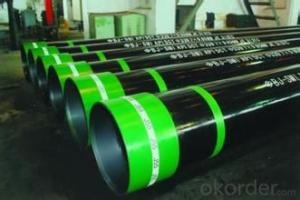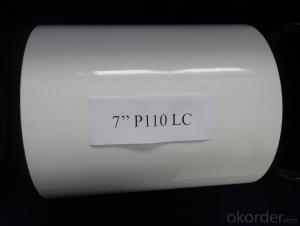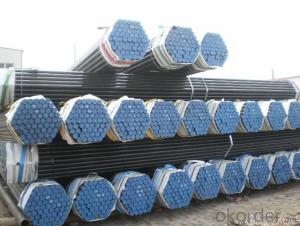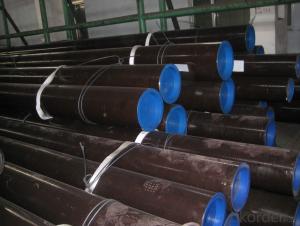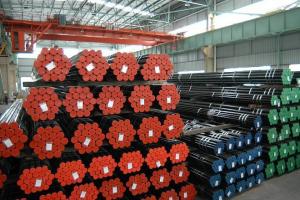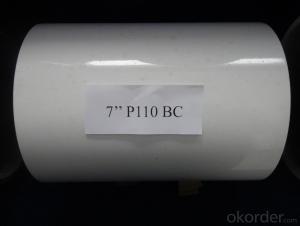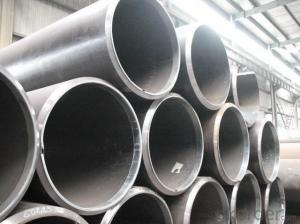9 5/8" 36ppf API 5CT seamless Casing pipe
- Loading Port:
- Shanghai
- Payment Terms:
- TT OR LC
- Min Order Qty:
- 10 m.t.
- Supply Capability:
- 100000 m.t./month
OKorder Service Pledge
Quality Product, Order Online Tracking, Timely Delivery
OKorder Financial Service
Credit Rating, Credit Services, Credit Purchasing
You Might Also Like
API 5CT Tubing & Casing nd Coupling
Size: OD 2 3/8"~ 4 1/2",4 1/2"~20"
Grade: H40,J55,K55,N80,C90,T95,P110
Length:R1,R2,R3
API 5CT Tubing & Casing nd Coupling
1. Size: OD 2 3/8"~ 4 1/2",4 1/2"~20"
2. Grade: H40,J55,K55,N80,C90,T95,P110
3. Length:R1,R2,R3
4. Stabdard: API SPEC 5CT
5. Application: Tubing is used to extracting petroleum and natural gas from a well.
6. Packing: bundle or loose
- Q: Seamed steel pipe seamless steel pipe, carbon steel pipe, galvanized pipe, four how to distinguish between
- Major use differentiation:1, seamed tube can withstand the maximum operating pressure is generally less than 20 kg, which is the most secure use. It is generally used in water, gas, compressed air and other low-pressure fluid;2 seamless tube can withstand ultra-high pressure, of course, its wall thickness will also increase, which needs to be designed according to pressure requirements. It is generally used in high-pressure oil pipes, boiler tubes and other high temperature and high pressure equipment. There are also seamless tubes for structural purposes, depending on the design requirements.3, there are some seamed steel pipe seamless treatment tube, it is the weld annealing treatment, eliminate the residual stress of the weld, the weld and base material, the pressure range of basic and seamless pipe is. May also consider the use of.4, of course, the market also has some use overall heating after drawing steel pipe joints or mandrel rolling seamless steel pipe, mainly in small size, only in the shape of this kind of pipe belongs to the seamless tube, it is not very good
- Q: Are steel pipes resistant to corrosion?
- Yes, steel pipes are resistant to corrosion due to the protective layer formed by the oxide film on their surface. However, their resistance can vary depending on the specific type of steel and the conditions they are exposed to.
- Q: How do you select the right size of steel pipe for a project?
- To select the right size of steel pipe for a project, you need to consider factors such as the intended application, flow rate, pressure requirements, and structural integrity. It is essential to consult industry standards and guidelines, conduct engineering calculations, and seek professional advice to determine the appropriate pipe size that ensures optimal performance and safety for your specific project.
- Q: What is the average lead time for manufacturing steel pipes?
- The average lead time for manufacturing steel pipes can vary depending on several factors such as the complexity of the design, size of the order, and the specific production capabilities of the manufacturer. Typically, it can range from a few weeks to a few months.
- Q: What is the difference between the stainless steel pipe welded pipe and seamless pipe?
- Concentricity: seamless tube manufacturing process is the temperature of 2200 degrees F in stainless steel billet stamping a hole, at this high temperature, tool steel by stamping and drawing become soft and spiral form from the hole. Thus, the wall thickness of the pipeline is uneven and the eccentricity is high. Thus ASTM allows seamless pipe wall thickness ratio of the wall thickness difference of seamed tube. Through the seamed tube cold rolling plate precision (per roll width is 4-5 feet) made. These cold rolled plates usually have a maximum wall thickness of 0.002 inches. The steel plate is cut into a width of PI D, in which D is the outer diameter of the pipe. Tube wall thickness tolerance is very small, and the entire circumference of the wall thickness is very uniform.
- Q: Can steel pipes be used for oil and gas transportation?
- Yes, steel pipes are commonly used for oil and gas transportation due to their strength, durability, and resistance to corrosion.
- Q: What does "SC50" steel pipe mean in civil engineering?
- SC50: laying on welded steel tubes of diameter 50mm. SC is usually used in electrical installation drawings.
- Q: Are steel pipes suitable for use in hydropower plants?
- Yes, steel pipes are suitable for use in hydropower plants. Steel pipes offer excellent durability, strength, and resistance to corrosion, making them ideal for transporting water or other fluids in hydropower systems. Additionally, steel pipes can withstand high pressure and provide efficient flow rates, ensuring reliable and efficient operation of the hydropower plant.
- Q: How are steel pipes used in the marine industry?
- Steel pipes are commonly used in the marine industry for various applications such as shipbuilding, offshore oil and gas exploration, and marine infrastructure. They are utilized for constructing hulls, pipelines, and support structures due to their high strength, durability, and resistance to corrosion from seawater. Steel pipes also provide a reliable and efficient means of transporting fluids, gases, and other materials within marine vessels and structures.
- Q: How are steel pipes insulated to prevent condensation?
- Steel pipes are typically insulated using materials such as foam or fiberglass that have low thermal conductivity. These insulating materials create a barrier that prevents the transfer of heat between the pipe and the surrounding environment, reducing the temperature difference and minimizing the chance of condensation occurring on the pipe surface.
Send your message to us
9 5/8" 36ppf API 5CT seamless Casing pipe
- Loading Port:
- Shanghai
- Payment Terms:
- TT OR LC
- Min Order Qty:
- 10 m.t.
- Supply Capability:
- 100000 m.t./month
OKorder Service Pledge
Quality Product, Order Online Tracking, Timely Delivery
OKorder Financial Service
Credit Rating, Credit Services, Credit Purchasing
Similar products
Hot products
Hot Searches
Related keywords
